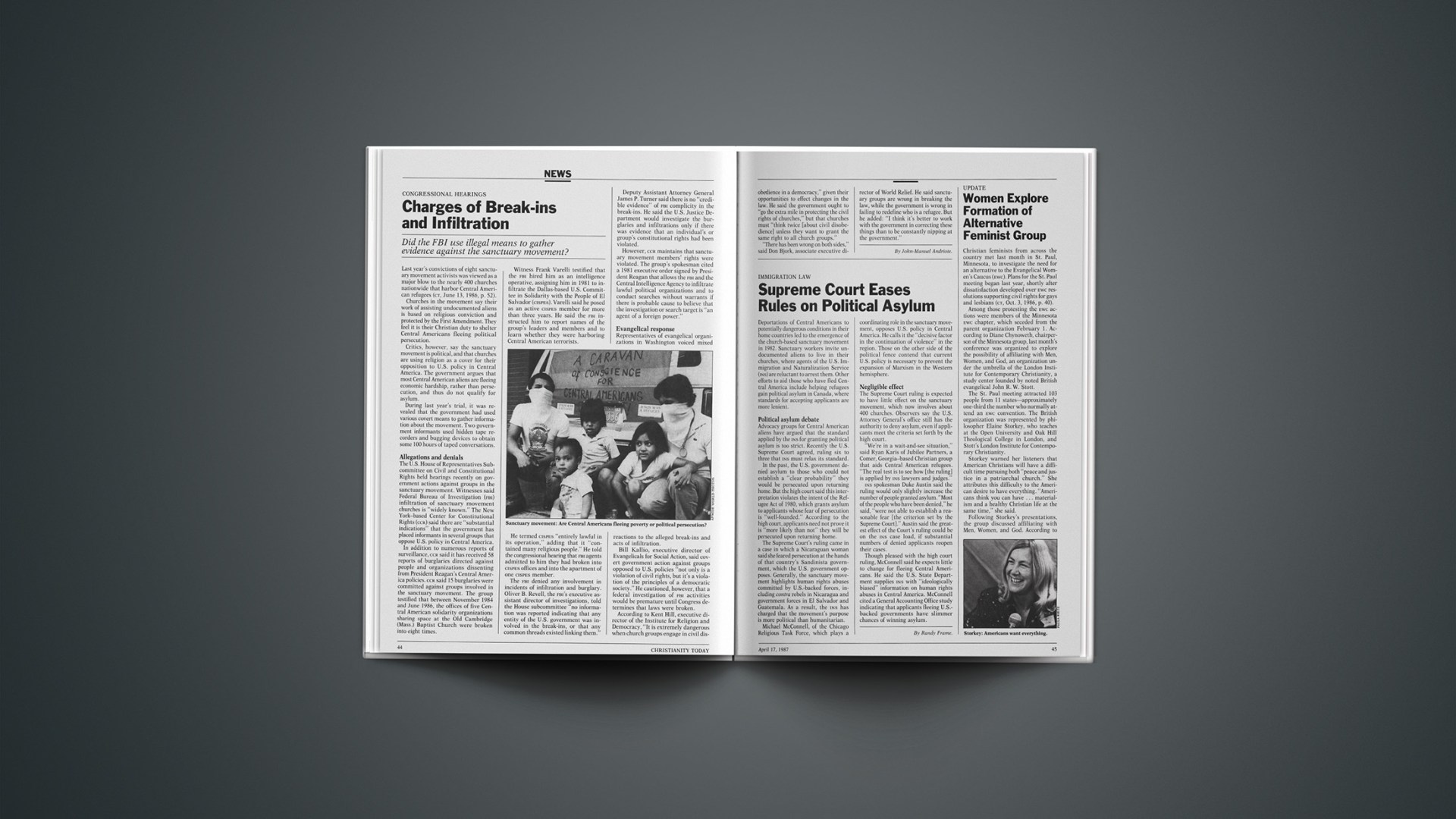Last year’s convictions of eight sanctuary movement activists was viewed as a major blow to the nearly 400 churches nationwide that harbor Central American refugees (CT, June 13, 1986, p. 52).
Churches in the movement say their work of assisting undocumented aliens is based on religious conviction and protected by the First Amendment. They feel it is their Christian duty to shelter Central Americans fleeing political persecution.
Critics, however, say the sanctuary movement is political, and that churches are using religion as a cover for their opposition to U.S. policy in Central America. The government argues that most Central American aliens are fleeing economic hardship, rather than persecution, and thus do not qualify for asylum.
During last year’s trial, it was revealed that the government had used various covert means to gather information about the movement. Two government informants used hidden tape recorders and bugging devices to obtain some 100 hours of taped conversations.
Allegations And Denials
The U.S. House of Representatives Subcommittee on Civil and Constitutional Rights held hearings recently on government actions against groups in the sanctuary movement. Witnesses said Federal Bureau of Investigation (FBI) infiltration of sanctuary movement churches is “widely known.” The New York-based Center for Constitutional Rights (CCR) said there are “substantial indications” that the government has placed informants in several groups that oppose U.S. policy in Central America.
In addition to numerous reports of surveillance, CCR said it has received 58 reports of burglaries directed against people and organizations dissenting from President Reagan’s Central America policies. CCR said 15 burglaries were committed against groups involved in the sanctuary movement. The group testified that between November 1984 and June 1986, the offices of five Central American solidarity organizations sharing space at the Old Cambridge (Mass.) Baptist Church were broken into eight times.
Witness Frank Varelli testified that the FBI hired him as an intelligence operative, assigning him in 1981 to infiltrate the Dallas-based U.S. Committee in Solidarity with the People of El Salvador (CISPES). Varelli said he posed as an active CISPES member for more than three years. He said the FBI instructed him to report names of the group’s leaders and members and to learn whether they were harboring Central American terrorists.
He termed CISPES “entirely lawful in its operation,” adding that it “contained many religious people.” He told the congressional hearing that FBI agents admitted to him they had broken into CISPES offices and into the apartment of one CISPES member.
The FBI denied any involvement in incidents of infiltration and burglary. Oliver B. Revell, the FBI’S executive assistant director of investigations, told the House subcommittee “no information was reported indicating that any entity of the U.S. government was involved in the break-ins, or that any common threads existed linking them.”
Deputy Assistant Attorney General James P. Turner said there is no “credible evidence” of FBI complicity in the break-ins. He said the U.S. Justice Department would investigate the burglaries and infiltrations only if there was evidence that an individual’s or group’s constitutional rights had been violated.
However, CCR maintains that sanctuary movement members’ rights were violated. The group’s spokesman cited a 1981 executive order signed by President Reagan that allows the FBI and the Central Intelligence Agency to infiltrate lawful political organizations and to conduct searches without warrants if there is probable cause to believe that the investigation or search target is “an agent of a foreign power.”
Evangelical Response
Representatives of evangelical organizations in Washington voiced mixed reactions to the alleged break-ins and acts of infiltration.
Bill Kallio, executive director of Evangelicals for Social Action, said covert government action against groups opposed to U.S. policies “not only is a violation of civil rights, but it’s a violation of the principles of a democratic society.” He cautioned, however, that a federal investigation of FBI activities would be premature until Congress determines that laws were broken.
According to Kent Hill, executive director of the Institute for Religion and Democracy, “It is extremely dangerous when church groups engage in civil disobedience in a democracy,” given their opportunities to effect changes in the law. He said the government ought to “go the extra mile in protecting the civil rights of churches,” but that churches must “think twice [about civil disobedience] unless they want to grant the same right to all church groups.”
“There has been wrong on both sides,” said Don Bjork, associate executive director of World Relief. He said sanctuary groups are wrong in breaking the law, while the government is wrong in failing to redefine who is a refugee. But he added: “I think it’s better to work with the government in correcting these things than to be constantly nipping at the government.”
By John-Manuel Andriote.










